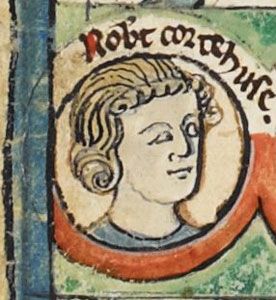Almost Kings - Robert Curthose
Posted on
If you consider that in the medieval period, the eldest son was the main heir to his father's estate, then you can't help but feel very sorry for poor Robert Curthose. As the eldest son of William, Duke of Normandy and Matilda of Flanders, he was already due to inherit Normandy in the future. In 1066 his father became King of England, and the teenage Robert would have been able to think of himself as the future King Robert I of England. 
Born in the early 1050s (1051 to 1053 tend to be quote most frequently) Robert was named after his paternal grandfather, and King Robert of France who was his mother's grandfather. His nickname “Curthose” seems to have come from his father and was a reference to his short height. Given that his mother Matilda has been rumoured to be relatively small it may be that Robert inherited his height from her. But while he seems to be quite distant from his father, no one could doubt Matilda's devotion to her eldest son.
Conflict would become a big problem between Robert and his father as the young man got older. Any time William was absent from Normandy he left Matilda in charge, in Robert's name. As he grew in to an adult Robert demanded more responsibility, but William refused. This led to Robert leading a rebellion against his father, during which William was actually unseated from his horse and wounded. Robert had been supported by his mother, which infuriated William, but in the end Matilda managed to arrange a reconciliation between father and son. It appears to have fallen apart on Matilda's death in 1083 as Robert spent several years travelling around Europe and avoiding his father's court. Back in England William the Conqueror was considering disinheriting Robert entirely. Although one son, Richard, was already dead William still had two more sons – William Rufus and Henry.
Instead on William's death he divided his lands between his two eldest sons. Robert became the Duke of Normandy, but his younger brother William Rufus became King William II of England. Their youngest brother Henry was left some money but not much else. As a result of this division, William and Robert viewed each other with hostility; both wanted to be King of England and Duke of Normandy simultaneously as their father had been. However both of them were also childless, Robert had several illegitimate children but no legitimate heirs, and the two men recognised each other as heir to their respective lands. Robert still held a loose alliance with rebels against William in England, but his attentions were held elsewhere.
In 1096 Robert joined the First Crusade and travelled to the Holy Land, having mortgaged Normandy to William in return for funds to pay for his trip. He was away for four years, and was still making his way home when news arrived that William had been killed in a hunting accident. Robert was William's acknowledged heir, and as the eldest son he would now surely become King Robert I of England and Duke of Normandy.
No, the distance between him and home gave his younger brother Henry ample time to seize the English throne and get settled in. Robert botched an invasion, and had to renounce his claim to the throne in the Treaty of Alton. Five years later Henry returned the favour by invading Normandy. Robert was defeated and captured at the Battle of Tinchebray in 1106.
For the next twenty eight years Robert was imprisoned in a variety of castles around England and Wales. He died at Cardiff Castle on 3 February 1134, having lived to his late seventies or possibly early eighties, an impressive age for anyone let alone a prisoner. Henry, the younger brother who had stolen his Duchy and his throne, died a year later in 1135. With no surviving legitimate sons from either brother the country descended in to the period known as The Anarchy.
Last month's almost king was Edward of Angouleme.